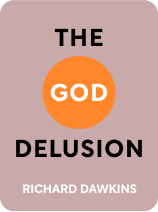

This article is an excerpt from the Shortform book guide to "The God Delusion" by Richard Dawkins. Shortform has the world's best summaries and analyses of books you should be reading.
Like this article? Sign up for a free trial here .
Are you looking for The God Delusion quotes? What do these quotes say about religion and what it means for society?
With these The God Delusion quotes, you’ll get key points from the book and what they mean. Richard Dawkins explains why religion is harmful, why God probably doesn’t exist, and what we can do about it.
Keep reading for the best The God Delusion quotes.
The God Delusion Quotes
These six The God Delusion quotes all explain Dawkins’ views on religion and God. He explains that when put to the test, God’s existence is unlikely. Additionally, he explains why organized religion is harmful to society. Check out these The God Delusion quotes for more.
“There is something infantile in the presumption that somebody else has a responsibility to give your life meaning and point… The truly adult view, by contrast, is that our life is as meaningful, as full and as wonderful as we choose to make it.”
This is one of The God Delusion quotes that talks about the belief in God. Proponents of God’s existence say that we should simply accept their account of how the universe came to be and the divine forces that govern it on faith, without question or evaluation. But why should we not apply the same rigorous testing and analysis to the question of God’s existence (we’ll refer to it as the God Hypothesis for the remainder of the summary) that would to any other assertion of fact? After all, the God Hypothesis is merely a hypothesis like any other.
And, of course, not all hypotheses are created equal. We use likelihood and probability to evaluate the truth of the claims put forward by any hypothesis. For example, the Tooth Fairy Hypothesis is a hypothesis about how money appears under children’s pillows in the morning after they place a baby tooth under them at night. No one can ever definitively “prove” the non-existence of the Tooth Fairy. But because we have more rational and more likely explanations for the appearance of the money under the pillow (namely, that parents are placing it there while their children are asleep), we can confidently assign a very low probability to the Tooth Fairy Hypothesis.
“Do not indoctrinate your children. Teach them how to think for themselves, how to evaluate evidence, and how to disagree with you.”
Another of religion’s dangers is the negative effect it has on children. Raising children in a tradition of faith constitutes an act of abuse in and of itself. Some of the most tragic victims of faith are the young children who are taught from the moment of birth by their parents, clergy, and community to unquestioningly accept a belief in God. This forced suspension of critical thinking stunts a child’s intellectual capacity and usually sets her up for a lifetime of guilt, shame, and fear.
We must stop indoctrinating children in the idea that faith is a virtue. Teaching children to unquestioningly obey authority and accept received wisdom without evidence hobbles their ability to think critically and robs them of the joys of intellectual discovery.
Children can’t choose their religion any more than they can choose their political affiliation, because they do not have a full grasp of the facts. It makes as much sense to say “She’s a Catholic child” or “She’s a Jewish child” as it does to say, “She’s a communist child” or “She’s a fascist child.”
Instead, we ought to say, “She’s a child of Christian parents,” making it clear that the choice of religion is something that only a competent adult, fully aware of the facts, can make. Filling children’s minds with superstition and fear of divine punishment, all while giving them no say in the matter, is a form of child abuse, little different than punching or kicking them.
“Do you really mean to tell me the only reason you try to be good is to gain God’s approval and reward, or to avoid his disapproval and punishment? That’s not morality, that’s just sucking up, apple-polishing, looking over your shoulder at the great surveillance camera in the sky, or the still small wiretap inside your head, monitoring your every move, even your every base though.”
Clearly, we don’t need God to explain our morality. In fact, the American philosopher and neuroscientist Sam Harris has noted that many of the behaviors we would traditionally associate with immorality, such as violent crime, are more prevalent in religious communities than secular ones.
For example, of the 25 most dangerous cities in America (by violent crime), 76 percent are in “red” states, with large numbers of conservative Christian residents. Similarly, we see far higher rates of abortion and teen pregnancy in the “Bible Belt” region of the Southern United States than we do in the rest of the country.
Furthermore, evolutionary biologist Marc Hauser’s research shows that when atheists and religious people are presented with a series of hypothetical moral dilemmas, there is zero measurable difference between the moral intuition of the two groups.
Moreover, there is something problematic about the claim, often advanced by religious people, that they behave in moral and upstanding ways only because God compels them to. This is not morality; it’s just fear of punishment and ingratiation to a powerful higher being. By claiming religion as the sole basis for their moral behavior, people of faith are in effect saying that they would kill, rape, and steal if they didn’t live in fear of God’s punishment. This is one of The God Delusion quotes that helps explain religious hypocrisies.
“I am thrilled to be alive at time when humanity is pushing against the limits of understanding. Even better, we may eventually discover that there are no limits.”
Atheists, for their part, can have a more healthy and affirming attitude toward both life and death because they don’t have to reconcile the rational part of their minds with a belief in God or an afterlife. Atheists are free to accept the idea that there was a period of time stretching from the beginning of the universe to the moment of their birth when they did not exist—and that death merely represents the resumption of that state of non-existence.
Not believing in an immortal soul or an afterlife opens your eyes to the truth that your existence is the very briefest flicker of a candle in the vast history of the universe. Your non-existence is the natural and normal state of affairs. You just happen to be living through a fleeting exception.
Knowing that, life can be as joyous or as sad as you choose to make it. By freeing themselves from theological baggage, atheists can embrace their full potential and be empowered in the knowledge that they shape their experiences in life—not some tyrannical, omnipotent celestial master. Theists are permanently denied this life-affirming gift.
“If all the evidence in the universe turned in favour of creationism, I would be the first to admit it, and I would immediately change my mind. As things stand, however, all available evidence (and there is a vast amount of it) favours evolution.”
Creationists believe that the universe we observe is the handiwork of an intelligent designer who consciously and knowingly created everything, from the movement of galaxies throughout the universe to the orbit of electrons within an atom. For creationists, an intelligent God is the ultimate and simple explanation for everything.
But this is where the “simple” theistic position begins to fall apart. If all things can be said to have their root cause in an intelligent God, then one must raise the obvious question—what is the root cause of God? Who designed the designer?
This is the fundamental flaw at the heart of most theistic arguments. You can postulate an infinite regression of the physical universe that terminates with God. But if you can’t explain the existence of God in the first place, the argument collapses.
“[God is] a vindictive bloodthirsty ethnic cleanser , a misogynistic, homophobic racist, an infanticidal, genocidal, phillicidal, pestilential, megalomaniacal, sadomasochistic, capriciously malevolent bully.”
Far from providing the basis for our morality, religion actually does the very opposite. In reality, religious texts promote abhorrent values that are totally at odds with modern morality.
Take the Old Testament—considered a holy text in Judaism, Christianity, and Islam—that celebrates:
- A cruel, jealous, and vindictive God who drowns all the men, women, children, and animals in the world (save for Noah) when he feels that they are not sufficiently pious and obedient
- Lot inviting a group of men, who wish to sodomize the two angels he is harboring in his home, to instead gang-rape his daughters (with whom Lot later commits incest)
- Abraham’s unflinching willingness to slaughter his son Isaac in cold blood simply because God commanded him to do so (God eventually saves Isaac after being convinced of Abraham’s loyalty)
- The warrior Jephthah sacrificing his daughter in an act of ritual murder in order to give thanks to God after the latter grants him a military victory
- Joshua’s destruction of the city of Jericho and the genocidal slaughter and enslavement of its citizens
Although the figure of Jesus Christ in the New Testament is far more gentle and benevolent than the domineering bully God of the Old Testament, the later text still has its share of barbarism. The gruesome story of Jesus’s crucifixion and martyrdom on behalf of our collective sins is incredibly psychologically damaging to the billions of people around the world who have been forced to learn it. It instills in the believer a lifetime of guilt and self-hatred, knowing that the only Son of God died on the cross because of your wickedness and sinfulness (even if the crucifixion happened nearly two millennia before you were born).
Hopefully, these The God Delusion quotes help you understand major ideas in the book and can give you things to think about.

———End of Preview———
Like what you just read? Read the rest of the world's best book summary and analysis of Richard Dawkins's "The God Delusion" at Shortform .
Here's what you'll find in our full The God Delusion summary :
- Why Dawkins thinks religion has exerted a harmful influence on human society
- How Dawkins concludes that the existence of God is unlikely
- The 3 arguments that challenge the existence of God






